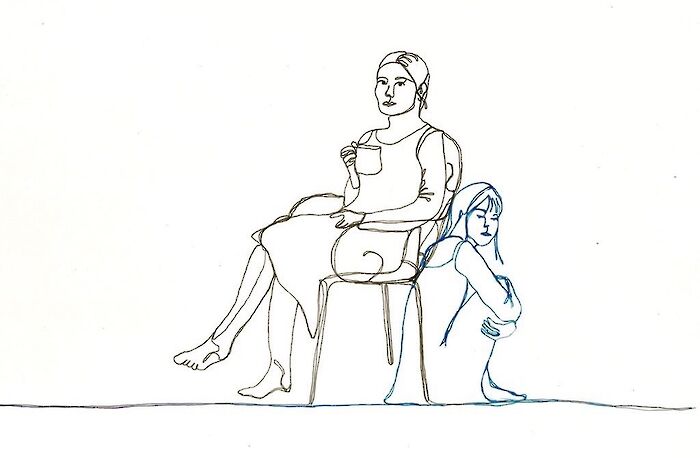From ‘too brown’ to ‘not brown enough’
In her second column, Inaya Mohmood reflects on how moving from her majority-white town to Cambridge changed her relationship with her Pakistani heritage

Growing up in a majority-white area, my identity as a Pakistani always took a back seat. I’ve only visited Pakistan once in my life. I was around six years old, and the culture shock I experienced as I left my large town in England for a small village in rural Kashmir was so overwhelming that I’ve turned down every opportunity my parents have given me to go back since.
I found it hard to claim a culture that so visibly marked me as different. It was tiring to always have to help strangers correctly pronounce my name, ask for clarification whenever people asked me where I was from, and consistently be the only person in my classes to speak up on issues relating to being BME, whether cultural appropriation or institutional racism. These issues have always been and will always be really close to my heart, but as a 13- or 14-year-old, being the only person who had the lived experiences to talk about them felt like a burden.
At Cambridge, I found myself in an environment where even though I was in the minority, there was a minority community that I felt like I belonged to. Through student societies like the Islamic Society and Pakistan Society, I was finally interacting with people who I could relate to when it came to lived experiences. I was no longer the only person I knew who was Muslim or Pakistani, and knowing that I shared a background with a community larger than myself made all the difference; I no longer felt alone.
Slowly but surely, I’m undoing the whitewashing that had kept my own Pakistani heritage hidden away from me
It didn’t take long for the ‘coconut’ jokes to start. They didn’t bother me; I laugh at them too and I often agree with their reasoning. I can’t speak Urdu, I don’t know anything about cricket or Pakistani politics, and honestly, I hesitate a little when people ask me where in Kashmir I’m from.
But there is a sad truth behind the jokes, my background and being raised in a majority white area meant that where I once stood out as someone who was ‘too brown’ to fully fit in within some social circles. I now felt as though I wasn’t ‘brown enough’, I couldn’t join in when conversations about Pakistani music, or politics came up because I didn’t know enough, if anything, about them. I could sit in a room full of ‘brown’ people and still feel out of place.
For me, the biggest obstacle that has held me back from fully embracing my Pakistani heritage is the fact that I can’t speak Urdu. Laughably, when I was at school, being able to say ‘hello’ and ‘how are you’ in Urdu was enough for me to be regarded by my white friends as bilingual. Obviously, now that I’m around other people of Pakistani heritage, that really doesn’t cut it. I’ve always thought of Urdu as a beautiful language, and there is something very poignant about sitting in a room full of Urdu-speakers knowing that there is a massive hole in my knowledge of my country and its culture. As if not being able to speak to my grandparents in their native tongue wasn’t bad enough, knowing that I won’t be able to teach my children the language of their ancestors is equally difficult.
There has been something so bittersweet about my time here. Coming to Cambridge and finally finding spaces where I’m not made to feel like an outsider has been both comforting and empowering. A part of me is grateful for the chance to finally embrace the culture and the country that form a huge part of who I am. But the other half of me wishes that I didn’t grow up so oblivious to the beauty of Pakistan, and that I didn’t spend so long trying to fit in that I forgot about the country I came from. I know I can’t change how I felt back then — no one wants to feel different, and we’ve all felt insecure at some point in our lives about whether we fit in or not.
I’m grateful that this year, the friends I’ve made and the experiences I’ve had, have meant that I’m more open to exploring the culture of the country my family and I are from. There is so much more to who I am than simply being ‘different’ because of my ethnicity, and I’ve learnt more about myself this year than I ever had before. Slowly but surely, I’m undoing the whitewashing that had kept my own Pakistani heritage hidden away from me, and rediscovering who I am and where I come from.
 Features / Should I stay or should I go? Cambridge students and alumni reflect on how their memories stay with them15 December 2025
Features / Should I stay or should I go? Cambridge students and alumni reflect on how their memories stay with them15 December 2025 News / Cambridge study finds students learn better with notes than AI13 December 2025
News / Cambridge study finds students learn better with notes than AI13 December 2025 News / Dons warn PM about Vet School closure16 December 2025
News / Dons warn PM about Vet School closure16 December 2025 News / News In Brief: Michaelmas marriages, monogamous mammals, and messaging manipulation15 December 2025
News / News In Brief: Michaelmas marriages, monogamous mammals, and messaging manipulation15 December 2025 Comment / The magic of an eight-week term15 December 2025
Comment / The magic of an eight-week term15 December 2025









